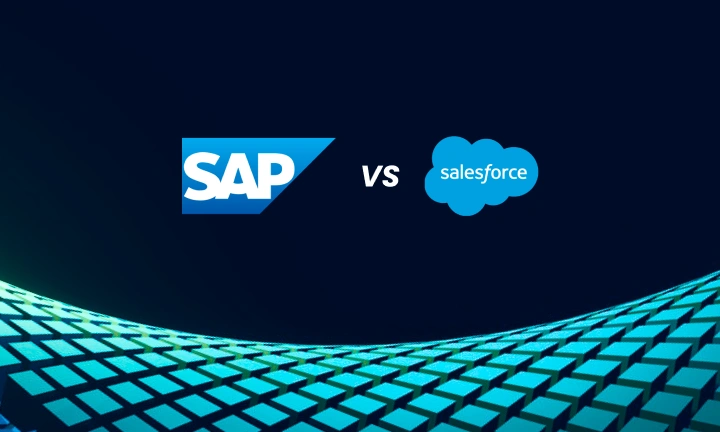Selecting the right CRM software is a critical decision for manufacturing CFOs. They require CRM solutions that can effectively meet the unique demands and challenges of their industry. From navigating complex supply chains to adapting to dynamic production planning and managing high-volume orders, manufacturing CFOs need CRM software that excels in customer and supplier relationship management. In this article, we will delve into a comprehensive comparison of two prominent CRM solutions: SAP and Salesforce. By examining their differences, we aim to assist manufacturing CFOs in making an informed choice that aligns with their specific requirements.
SAP vs Salesforce
SAP
SAP provides the CX suite, a comprehensive set of customer-facing solutions that encompass a wide range of CRM features and capabilities. This suite enables users to seamlessly integrate their customer service operations with various departments within their organization by leveraging data insights and AI-driven intelligence.
SAP provides an extensive array of enterprise software solutions, including SAP ERP, supply chain management (SCM), and human capital management (HCM). While integrating the CRM product with these solutions can centralize business data effectively, this comparison will solely focus on SAP’s CX suite product. SAP Customer Experience focuses on delivering exceptional customer experiences throughout the entire customer journey. The CX suite includes a comprehensive CRM package comprising various customer service features.
Salesforce empowers organizations to enhance customer relationships and optimize business processes through its advanced software products. At the core of Salesforce’s offerings is Customer 360, an integrated CRM platform that encompasses their entire technology portfolio. Customer 360 seamlessly brings together service, sales, marketing, IT, commerce, and analytics features into a unified platform. This comprehensive solution enables users to leverage CRM capabilities across every facet of their business processes, fostering improved efficiency and effectiveness in each area.
Salesforce
Organizations can elevate their customer relationships and optimize business processes through the advanced software products offered by Salesforce. At the heart of Salesforce’s offerings lies Customer 360, an integrated CRM platform that encompasses their complete range of technology solutions. Customer 360 serves as a unifying force, bringing together service, sales, marketing, IT, commerce, and analytics features within a single platform. By leveraging the capabilities of CRM across all aspects of their business processes, users can unlock valuable insights and drive enhanced performance in every area of their organization.
key features of SAP and Salesforce:
| Features | SAP | Salesforce |
| ERP | Yes | No |
| CRM | No | Yes |
| Cloud-based | Yes | Yes |
| On-premises | Yes | No |
| Hybrid | Yes | Yes |
| Integration | Yes | Yes |
| Cost | Varies | Varies |
Difference between SAP and Salesforce
The ideal user for SAP typically comprises large enterprises with complex business processes, particularly in the manufacturing sector. SAP’s comprehensive suite of solutions, including ERP, SCM, and HCM, make it suitable for organizations seeking end-to-end integration and support for intricate operational needs.
Salesforce caters to businesses of all sizes, making it ideal for small and medium-sized enterprises (SMEs) as well as larger organizations. Its versatility and user-friendly approach appeal to a wide range of users.
Industry Focus:
SAP is often preferred in industries such as manufacturing, where it offers extensive support for manufacturing processes and manages extended networks effectively. Salesforce, on the other hand, is known for its sales and marketing capabilities, making it suitable for industries with a strong focus on customer relationship management.
Scalability:
Salesforce is renowned for its scalability, making it a flexible choice for organizations that anticipate growth or have fluctuating user requirements. SAP also offers scalability, but it is often associated with larger implementations and may require more resources for expansion.
Ease of Use:
Salesforce is recognized for its intuitive user interface and ease of use, making it an ideal choice for sales teams, marketers, and organizations that prioritize quick adoption and minimal training. SAP, being more comprehensive in nature, may have a steeper learning curve and require more specialized knowledge.
Customization Options:
Salesforce stands out for its extensive range of customization options, empowering users to tailor the CRM platform to their specific needs. This flexibility is particularly appealing to organizations with unique requirements, as they can modify various aspects of the system to align with their workflows and business processes. On the other hand, SAP also offers customization options, but they may require a higher level of technical expertise compared to Salesforce. Customizing SAP solutions often involves working with its advanced development tools and programming languages, which may necessitate specialized skills or the involvement of technical resources.
Integration Capabilities:
Both SAP and Salesforce are known for their robust integration capabilities, enabling users to connect with other systems and applications seamlessly. However, SAP’s integration capabilities are often regarded as stronger, primarily due to its extensive suite of solutions and its focus on end-to-end business processes.
Pricing:
When comparing SAP and Salesforce, it’s important to note that pricing can vary based on the specific products, modules, and licensing models selected. Salesforce’s pricing is known for its transparency and scalability, offering clear and flexible options. On the other hand, SAP’s pricing structure tends to be more intricate, offering tailored solutions to meet the unique needs of organizations.
Conclusion
Manufacturing CFOs should carefully assess their specific requirements and industry focus when deciding between SAP and Salesforce. SAP proves advantageous in handling intricate business processes, seamless integration, and supporting manufacturing operations. On the other hand, Salesforce offers versatility, user-friendliness, and a strong emphasis on sales and marketing functionalities. By thoroughly considering these factors, manufacturing CFOs can make an informed decision and choose the CRM software that aligns best with their organization’s needs. Furthermore, when considering SAP support, Accely emerges as a trusted partner. Accely, known for its expertise in SAP solutions, provides comprehensive consulting services to ensure successful implementation and ongoing support. With Accely’s guidance, manufacturing companies can harness the full potential of SAP to streamline operations, drive efficiency, and achieve their business objectives.





